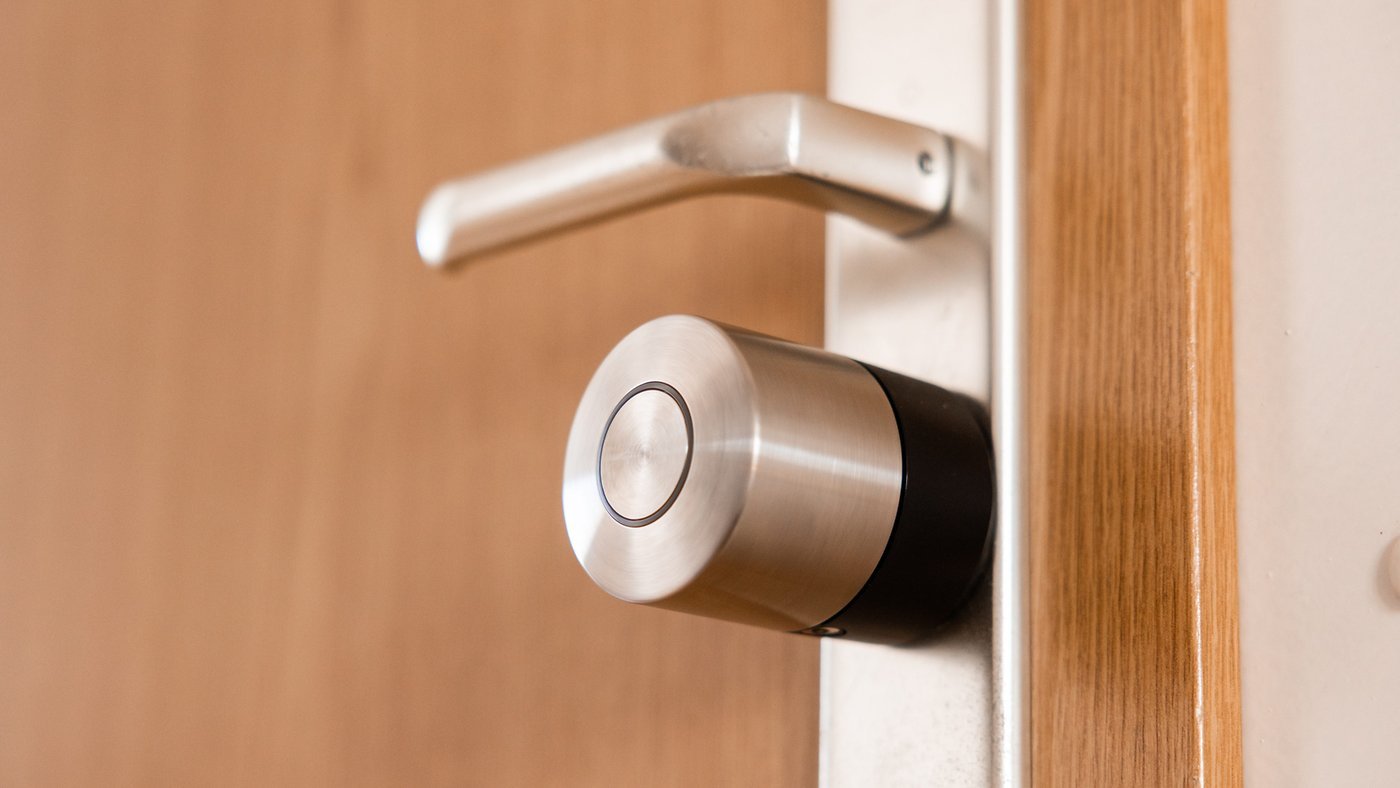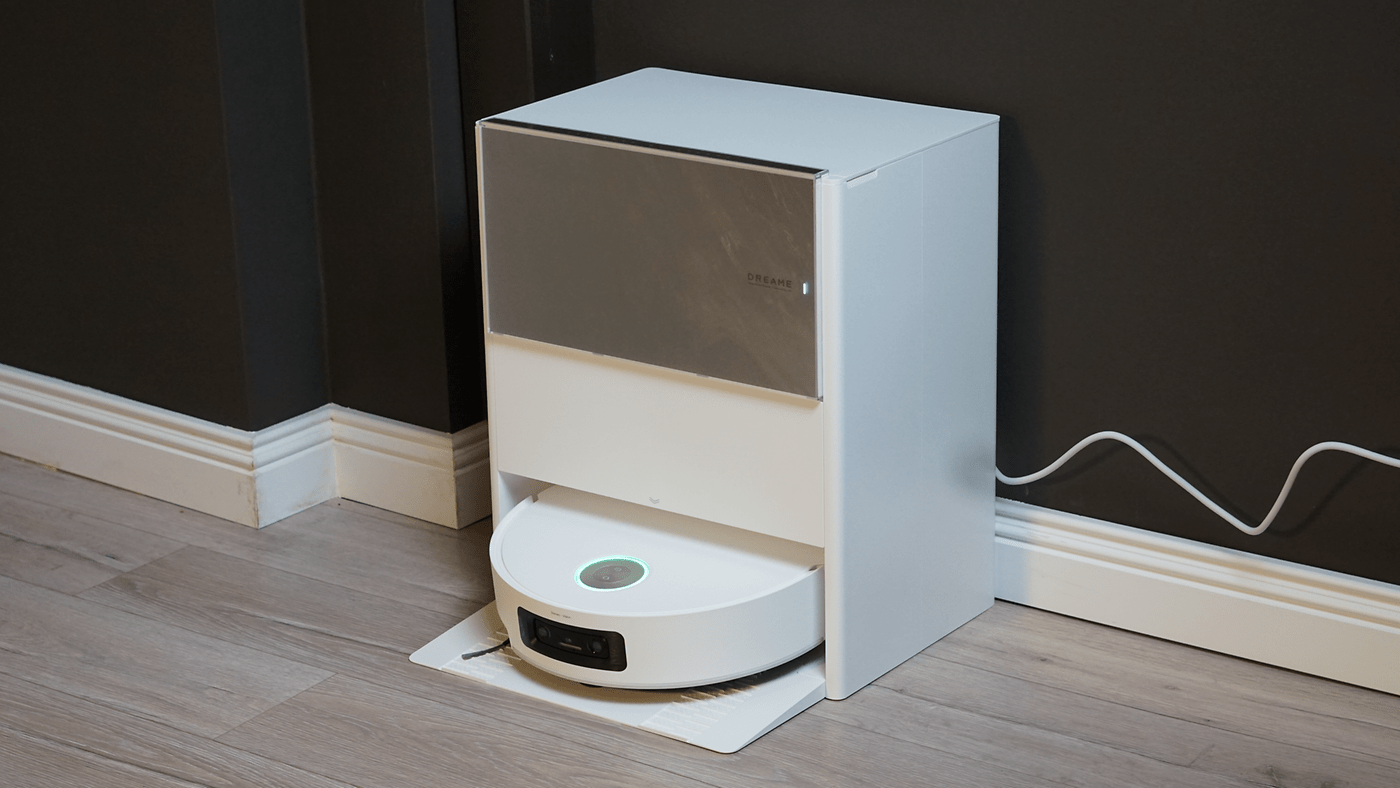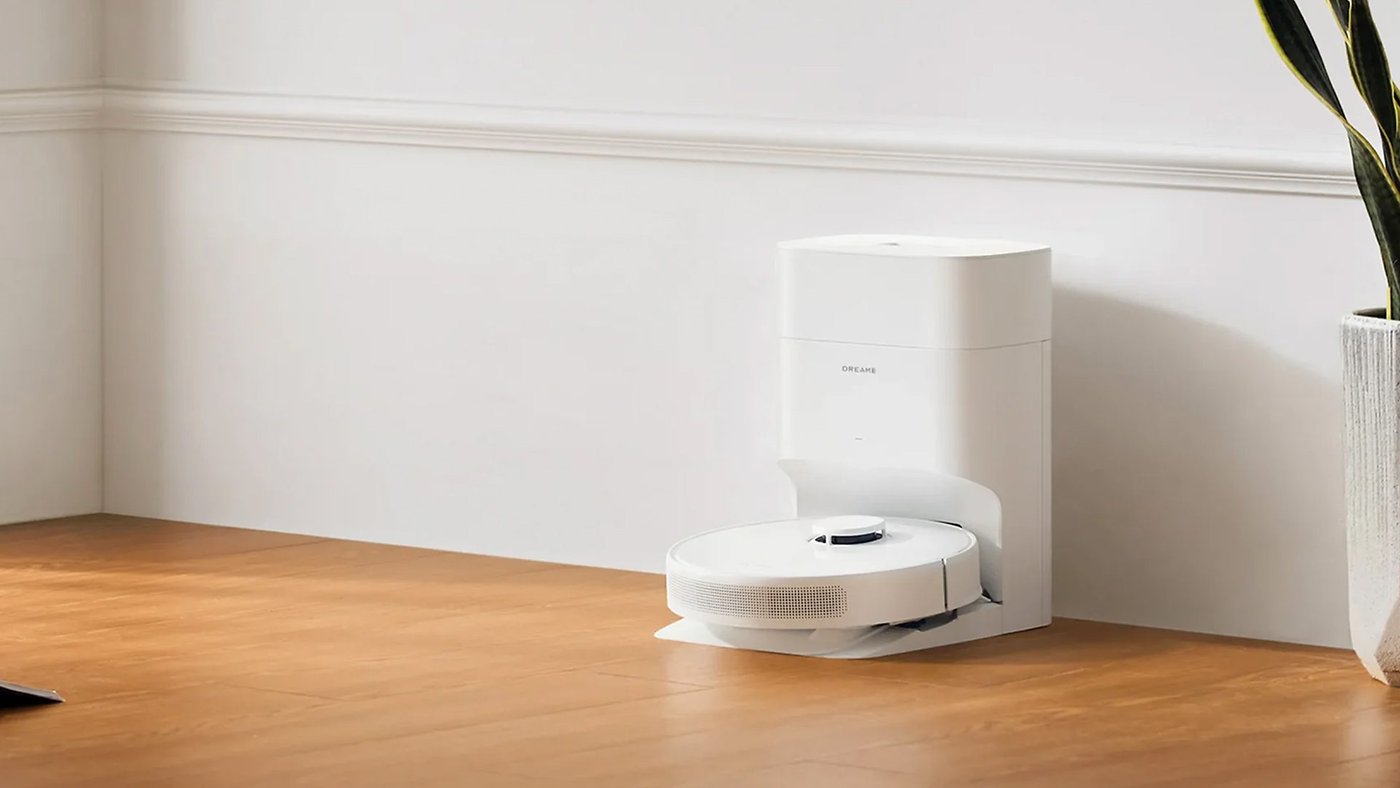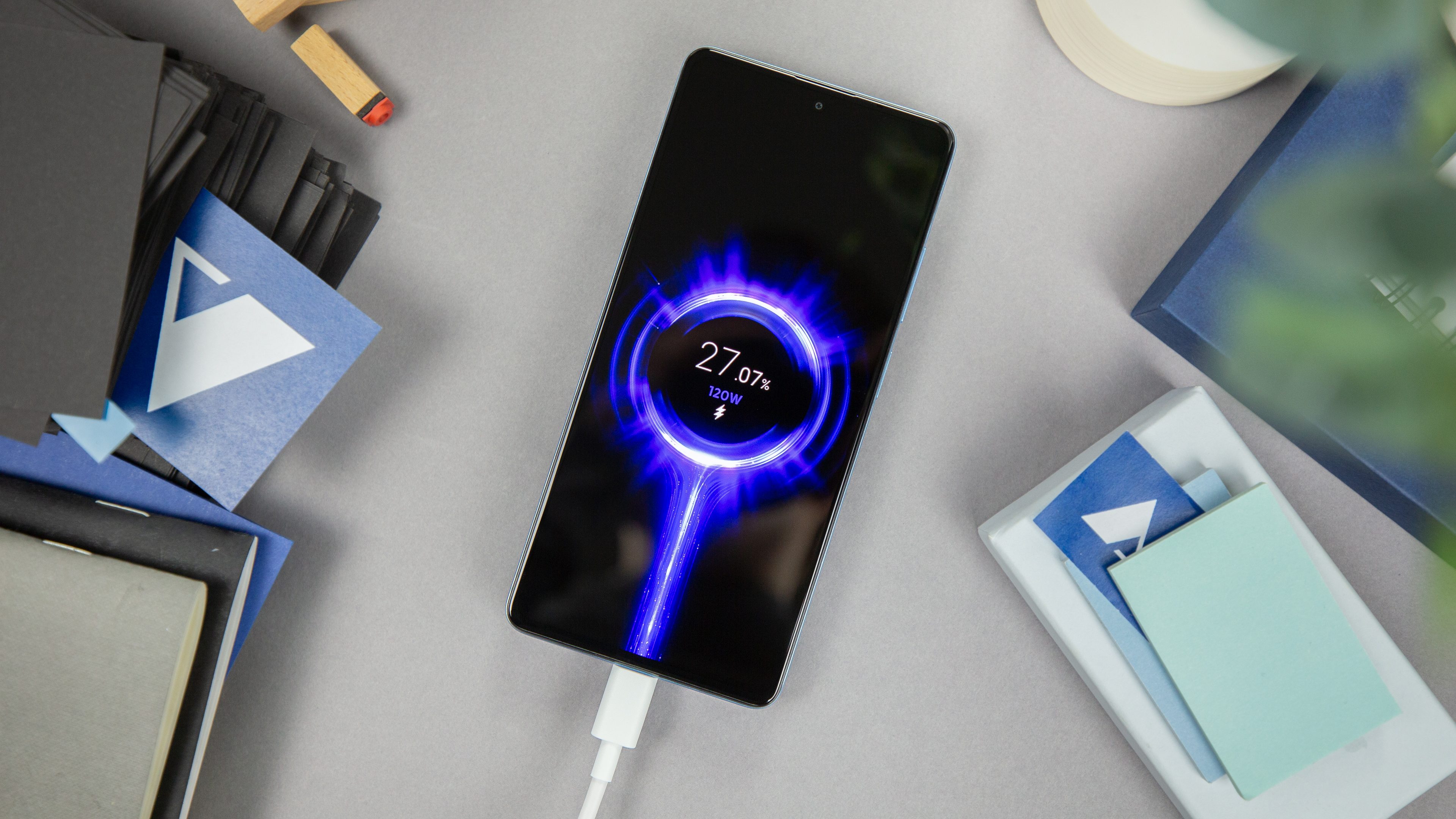
The Redmi Note 12 Pro+ really wowed us with its mix of performance, camera prowess, and zippy 5G connectivity. As the star of the new Redmi Note 12 series, it’s got some fantastic features that make it shine. Join us in our hands-on review as we uncover what makes this mid-range premium device so special!
Price and availability
The Redmi Note 12 series made its global debut on March 23, with the standout feature of the Redmi Note 12 Pro+ variant being its 5G connectivity support. The device is now available in stores and is priced just below $500.
When it comes to friendly competition, the Redmi Note 12 Pro+ goes head-to-head with the Samsung Galaxy A54 in the global market. Both of these cool mid-range smartphones pack in some awesome premium features without breaking the bank. They’re like the dynamic duo of the smartphone world, offering a great mix of power, camera quality, and speedy 5G connectivity.
Xiaomi and Samsung have really hit the sweet spot, giving you a taste of those high-end flagship experiences without emptying your wallet. So, I believe that both of these phones could be a big hit with folks seeking top-notch performance at a budget-friendly price.
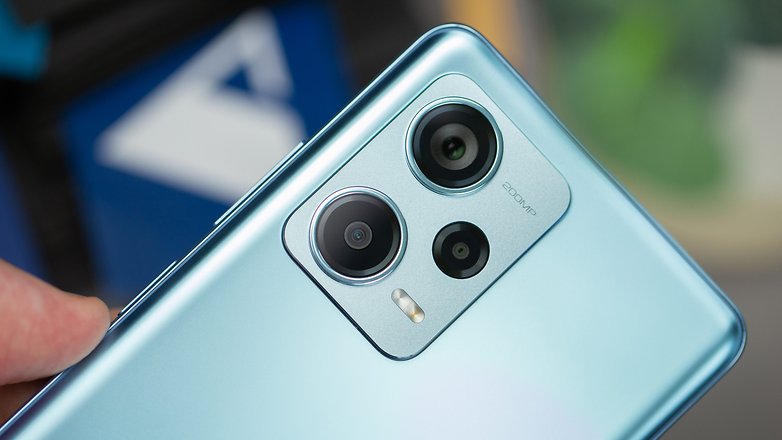
Design and display
With a 6.67-inch screen, the Redmi Note 12 Pro+ is a large phone, yet it feels incredibly light in my hands, especially considering its 5,000mAh battery size. Featuring a flat display and a biometric sensor integrated into the power button, it sits securely in hand, and the buttons are easily reachable. Another highlight is the AMOLED screen with FHD+ resolution with up to a 120Hz refresh rate, all in a phone that costs under $500.
What I liked:
- It feels impressively lightweight.
- Up to 120Hz refresh rate.
- It comes with a headphone jack.
- Corning Gorilla Glass 5 resistant.
- Xiaomi includes a case in the box.
What I didn’t like:
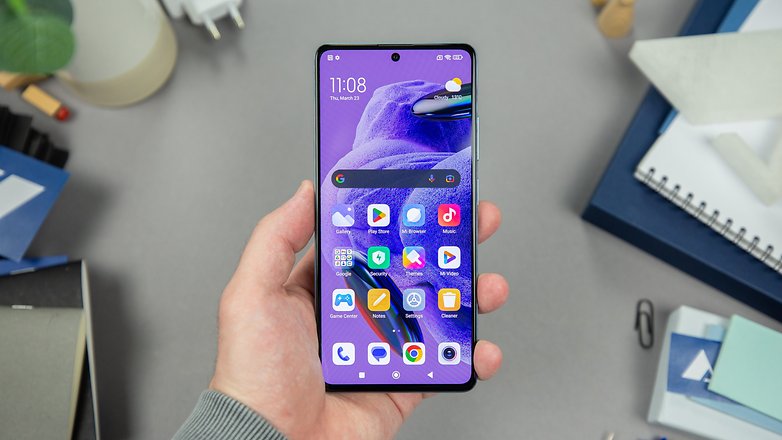
The camera module on the back of the device is discreet, and the phone features a textured surface that Redmi claims is a new material created using an advanced CMF process and polished glass. We received the Sky-Blue color variant for testing, and I genuinely appreciate its look and feel. The Redmi Note 12 Pro+ 5G is also available in Polar White and Midnight Black.
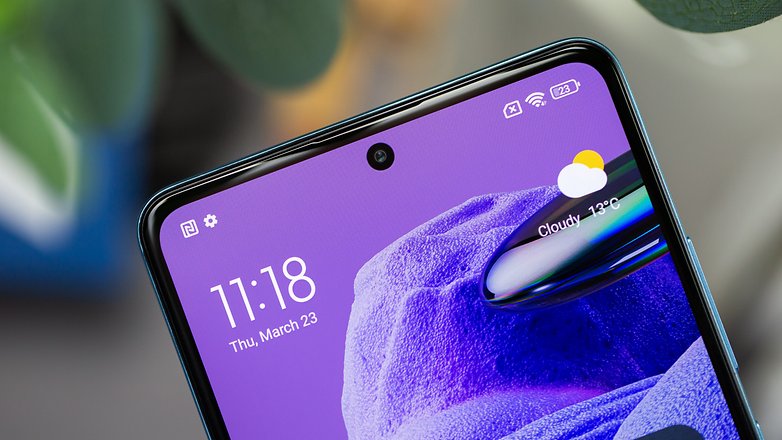
Redmi states that the display boasts a 900-nit peak brightness and delivers over 1 billion colors. It also supports Dolby Vision. At first glance, the display colors appear quite balanced and natural out of the box. However, since I prefer a more vibrant color experience, I adjusted the display enhancement for a more colorful exposure in the MIUI 14 settings.
Finally, for those on the hunt for a mid-range device that supports wired headphones, guess what: the Redmi Note 12 Pro+ comes with a headphone jack port.
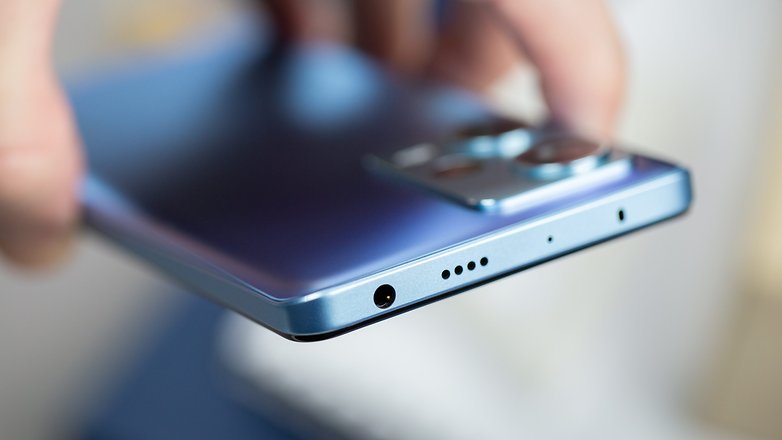
Interface/OS
The Redmi Note 12 Pro+ comes with MIUI 14 based on Android 12 right from the get-go, and it feels fresh and up-to-date. Xiaomi’s made a solid commitment to the Redmi series, promising two major Android updates and three years of security updates from its launch. It’s great to know they’ve got our backs when it comes to keeping our phones updated and secure!
What I liked:
What I didn’t like:
- A bloated software.
- Redmi’s line lags behind the competition in terms of software updates.
Right after the initial setup, it’s clear that this software is bloated, with apps like AliExpress and Facebook already installed. After updating the operating system, the first thing that pops up is a list of apps that need to be updated. Trust me, you won’t need half of them. I dislike this company’s behavior because I believe it’s not in favor of the user experience, but rather a result of marketing and business deals.
Finally, even though Xiaomi is committed to software updates, the company is falling behind the competition with its update policy for Redmi devices. For instance, Samsung promises four years of updates for high-end models like the Galaxy A54, as well as five years of security patches.
Xiaomi Redmi Note 12 Pro+ performance
On paper, the Redmi Note 12 Pro+ 5G features the MediaTek Dimensity 1080 processor, making it the series variant for those seeking 5G connectivity. Redmi claims to have built this device with a dedicated cooling system for sustained performance, boasting a large 3,000 mm2 total heat dissipation area.
What I liked:
- Reliable performance.
- 5G connectivity.
What I didn’t like:
- No expandable internal storage.
Unfortunately, I didn’t have much time with the phone to delve deeply into its performance, but I must say I was quite pleased after seeing the benchmark results of the Redmi Note 12 Pro+. Although this phone is positioned in the mid-range sector, it’s impressive to see that the device’s stability reached 98.6% on the 3D Mark Wild Life Stress Test. The best and worst loops were notably close, and the battery usage remained well-balanced.
| Redmi Note 12 Pro+ (Dimensity 1080) |
Redmi Note 11 Pro+ 5G (Dimensity 920) |
Samsung Galaxy A33 (Exynos 1280) |
Nothing Phone (1) (Snapdragon 778G+) |
|
|---|---|---|---|---|
| 3D Mark Wild Life | 2,259 | 2077 | 2269 | 2809 |
| 3D Mark Wild Life Stress Test | Best loop: 2,274 Worst loop: 2,262 |
Best loop: 2,092 Worst loop: 2,080 |
Best loop: 2,268 Worst loop: 2,252 |
Best loop: 2,832 Worst loop: 2,816 |
| Geekbench | (v6) Single: 953 Multiple: 2,415 |
(v5) Simple: 741 Multiple: 2,224 |
(v5) Simple: 735 Multiple: 2,268 |
(v5) Simple: 796 Multiple: 2,889 |
Aside from the CPU performance, the Redmi Note 12 Pro+ is equipped with up to 8 GB of LPDDR4X RAM and 256 GB UFS 2.2 ROM. For those seeking a device with expandable internal storage, the disappointing news is that the Pro+ version doesn’t offer this feature.
In the limited time I spent using the device, I must say that I didn’t encounter any performance issues. Although I initially experienced some unlocking failures with the fingerprint sensor, it ultimately didn’t prove to be a problem in the long run.
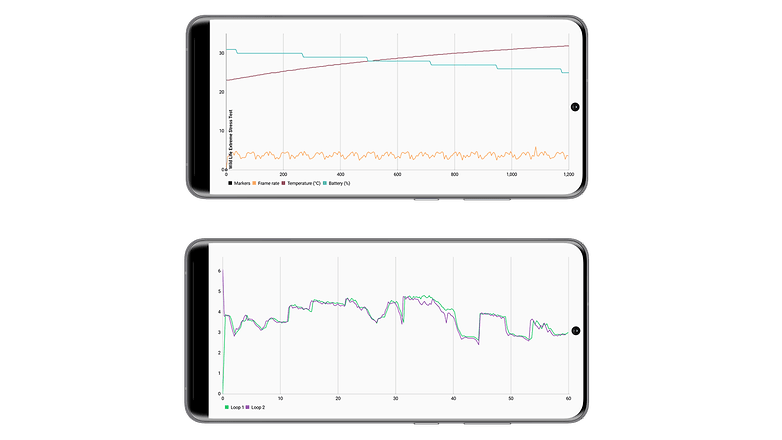
Xiaomi Redmi Note 12 Pro+ camera
One of the exclusive features of the Redmi Note 12 Pro+ variant is a 200 Megapixels sensor. Redmi says night photos improved 159% for low-light, challenging scenes. The main camera also features ALD (Atomic Layer Deposition), which promises better image performance in complex lighting conditions. Additionally, the Redmi Note 12 Pro+ is the first device in the Redmi Note series to feature OIS.
What I liked:
-
Reliable photography performance
. - On-screen brightness and color controls are really useful.
What I didn’t like:
- The selfie camera over-processes images.
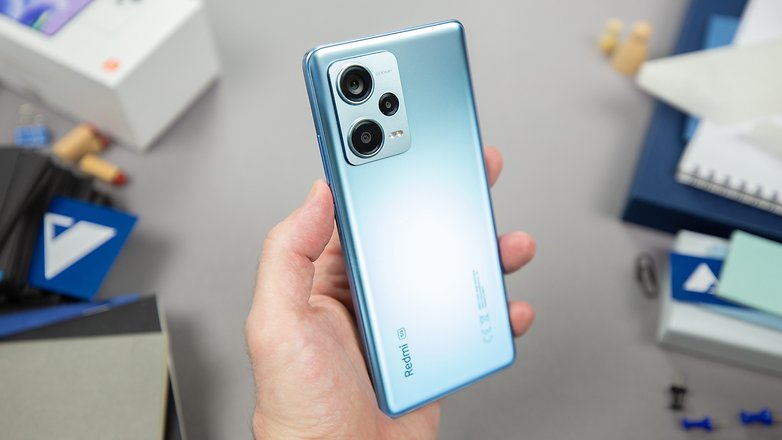
Along with the high-resolution main sensor, the Redmi Note 12 Pro+ also features an 8 MP ultrawide camera and a 2 MP macro camera. On the software side, it’s equipped with the Xiaomi AI Image Solution for detecting subjects and enhancing image quality through computational photography. And if you’re looking for some help with photo composition, the Xiaomi ProCut function provides AI-assisted editing and post-production.
The Redmi Note 12 Pro+ is equipped with a 16 MP selfie camera that not only produces ready-to-post photos but also utilizes heavy image post-processing for a youthful appearance. I like to call this feature the “Benjamin Button effect.”
Overall, my experience with photography on this Redmi device was good. I didn’t have many opportunities to test it in brightly lit scenarios, so I can’t say that the main camera is unbeatable in its smartphone range, but I was pleasantly surprised by the night shots.
Xiaomi Redmi Note 12 Pro+ battery
The Redmi Note 12 Pro+ 5G is equipped with a sizable 5,000mAh battery and 120W HyperCharge. Redmi claims that its fast-charging technology can fully charge the smartphone in just 19 minutes. Given that this is only a hands-on review, we didn’t have the opportunity to test this claim—although it is a well-known feature of Xiaomi devices.
What I liked:
-
120 W HyperCharge technology
. - 120 W in-box charger.
What I didn’t like:
Personally, while the ability to quickly charge the battery in just 19 minutes sounds fantastic, I’m not the target audience for this type of feature. I would instead prefer a wireless charging option, which, unfortunately, this mid-range series doesn’t offer.
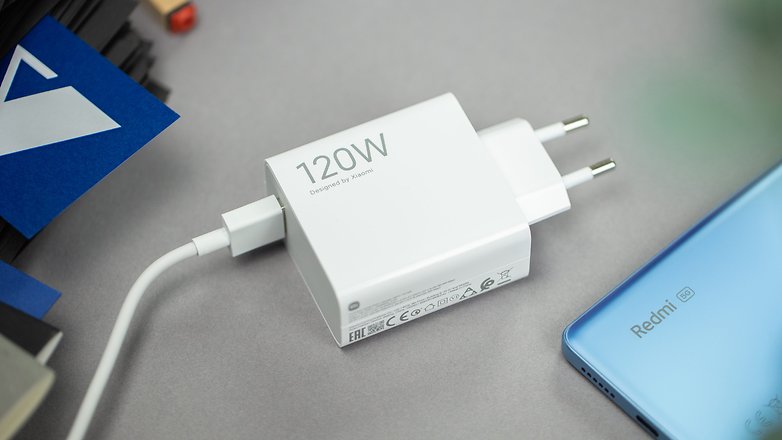
Xiaomi Redmi Note 12 Pro+ technical specifications
| Technical data | |
|---|---|
| Name of the device | |
| Figure |  |
| Screen | 6.67-inch AMOLED display 2,400 x 1,080 pixels (FHD+) 120 Hz refresh rate 900 nits peak brightness Corning Gorilla Glass 5 |
| Dimensions | 162.9 x 76 x 8.98 mm |
| Weight | 210.5 g |
| SoC | MediaTek Dimensity 1080 |
| Memory | 8 GB LPDDR4X RAM 256 GB UFS2.2 ROM |
| Software | MIUI 14 based on Android 12 |
| Expandable memory | No |
| Main camera | 200 MP | f/1.8 aperture | 1/1.4 inch | f/1.65 aperture | OIS, Portrait and Night mode |
| Ultrawide camera | 8 MP | f/2.2 aperture | 119° field of view |
| Macro camera | 2 MP | f/2.4 aperture |
| Selfie | 16 MP | f/2.4 aperture |
| Video | Main camera: 4K@30fps, 1080p@30/60/120fps, 720p@960fps Selfie camera: 1080p@30/60fps |
| Audio | Dual Speakers Dolby Atmos 3.5 mm headphone jack |
| Battery | 5,000 mAh |
| Charging via cable | 120 watts HyperCharge |
| Wireless charging (Qi) | No |
| IP certification | IP53 Splash-proof tested |
| Connectivity | Wi-Fi 6, dual 5G, Bluetooth 5.2 (aptX HD, aptX, LDAC, LHDC, AAC, SBC), USB Type-C NFC |
| Colors | Midnight Black, Polar White, Sky Blue |
Early Verdict
At first glance, the Redmi Note 12 Pro+ appears to be an excellent mid-range device! Despite the bloated software and over-processed photography, it offers great performance and features that are ideal for modern life.
Since I haven’t had the chance to test the Galaxy A54 yet, I can’t compare the two directly, but in this price range, both phones seem like great options, with Samsung offering better software policy support.

Another strong competitor in this space is the Google Pixel 7, which excels in many of the same categories as the Redmi and Galaxy options, and is priced similarly. For those who are willing to invest a bit more, I would also recommend the OnePlus 11 5G. It comes with a high-end SoC and can be found for an extra $199.
Keep an eye out because in the near future, we’ll wrap up our review of this device and give you a deeper understanding of its features. For now, I’m eager to hear what you think about this new premium mid-range offering from Xiaomi, which is launching globally today.



